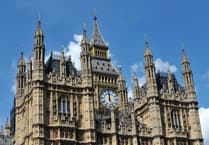A new report has been issued by food and farming charity Sustain that recognises Monmouthshire County Council for the significant work it has undertaken to help tackle the climate emergency.
Out of the 200 local authorities in the UK, only 12 per cent (21 councils) have made significant advances in their plans to tackle climate change according to the ‘Every Mouthful Counts’ report published on Thursday, November 10. Monmouthshire County Council is one of three councils in Wales included on the list for leading the efforts.
With an annual procurement spend of £70 billion, and as owners of up to 1.3 million acres of land, UK councils have significant opportunities to take action on climate change. Sustain found evidence of better performing councils taking action on food and farming including buying sustainable food for council catering, ensuring their county farms are sustainable, allocating land for local food growing and supporting citizens to eat more healthy, sustainable diets. But the findings from Sustain show that the majority are not doing so.
Councils’ services and food production in the UK are already being disrupted by extreme weather. Food price rises caused by climate change will cost the average UK household an estimated £170 this year. Farmers are already counting losses from extreme weather in summer 2022, and dangerous flooding is predicted in February.
Sustain examined the climate, biodiversity and food plans of 179 UK Local Authorities and found that:
• Six in ten councils (59 per cent) did not include significant or meaningful action to reduce emissions from food and farming
• 29 per cent only had ‘barebones’ policies or plans in place
• Only 21 councils (about 12 per cent ) had more developed and measurable policies in place to cut food-related emissions. These are recognised as leaders.
Cllr Mary Ann Brocklesby, Leader of Monmouthshire County Council said: “I am delighted that Monmouthshire has been recognised for the actions we take around food, farming and the climate emergency. Addressing the climate and nature emergencies is core to how we operate. We still have a long way to go and we are committed to being zero carbon while protecting our biodiversity and the well-being of residents through our support to food systems and farming. That we are seen to be making a difference is a tribute to the hard work and dedication of all our staff and the partnerships they have forged with communities, organisations and businesses in Monmouthshire and beyond.”
Cllr Catrin Maby, Monmouthshire County Council’s cabinet member for Climate Change and the Environment, said: “In Monmouthshire, our efforts to address the climate emergency are far reaching, touching every area of our work. This includes supporting local producers, introducing electric vehicles to our fleet of buses and supporting biodiversity with our Nature Isn’t Neat work, amongst other initiatives. I am pleased to see Monmouthshire’s ongoing work receiving this recognition.”
Ruth Westcott, climate and nature emergency co-ordinator at Sustain said: “In the UK we have huge potential to grow more food, more sustainably, support great sustainable farmers and tackle the cost of living crisis and the climate crisis at the same time.
“We found examples of local councils doing a great job and there is lots they can do, from making their own farms sustainable to driving down food waste and opening up school food contracts to higher standard British farmers. Our Food for the Planet programme is full of ideas, drawing on examples of places who are already working on this. We also want to encourage councils to go further–adopting responsible food advertising policies, using planning powers to support sustainable farming but block polluting factory farming, and de-investing their pensions from intensive agriculture.
“Our research also showed how much national leadership matters. We now call on national governments to step up. The Westminster government must set clear targets and a pathway for reducing emissions from food and farming in the UK’s net zero strategy. This should include targets for local governments and–as a start–set standards to ensure that all meals served in the public sector reflect the Eatwell Guide. Councils must be given the resources they need to support a transition to more sustainable farming and diets at a local level.”
The report provides evidence of councils’ ability to act, with pioneering authorities including Monmouthshire, taking action including buying healthy and sustainable food for schools; meals in the community (‘Meals on Wheels’); social services catering; staff catering and events.
Food purchasing includes in the region of three million meals daily in more than 23,000 state schools, with an annual turnover of over £360 million UK-wide. Leading councils have set up localised purchasing systems, and encouraged more climate-friendly diets through public communication. Other councils were found to be increasing allotment and community food growing provision, transitioning council-owned farms to agroecological practices and tackling the causes of food waste.





Comments
This article has no comments yet. Be the first to leave a comment.